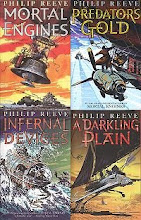Hi my name's Joe. Well, i suppose that's kinda obvious from the title! Anyway, as you can see from the top, my mum (i'm Tilly's bro) doesn't want sci-fi stuff. Well, she's gonna kill me but this book is sci-fi!!!
It's about a third rate museum curator's apprentice called Tom in the far, far, far future. Every land is barren except for a few little patches. Tom lives in London which can now move as it is built on traction wheels, like many other cities in the world. The planet has been pressured into Municipal Darwinism. This means that the bigger cities eat smaller cities. By eat I mean they salvage the metal and museums and such that there might be in the city/town/villiage.
Anyway, one day a mysterious girl comes to town and everything takes a sinister twist. Tom finds out things about his life that surprise and sicken him. He faces near death experiences, conspiracy theories and secrets that shake the very fibre of his being.
It is an amazing book and i am reading the second book in the four part series. Philip Reeve (the author) is an amazing writer and creates characters you can really relate to.
My question to stimulate discussion is: is Mortal Engines better than Northern Lights (Golden Compass)?
NEXT WEEK: I do a review on Skulduggery Pleasant.
Monday, 30 June 2008
Sunday, 29 June 2008
Why Jacqueline Wilson is my favourite author by Tilly Davies age 10
I love Jacqueline Wilson. I love her because she uses very good ideas in all of her books, the fave book of mine written by her is "Double Act" because you can relate to it. Also she uses such good words adverbs and other things to help her stories come a live. Every story is happy and sad in a weird way, but somehow it really works. That's why I LOVE HER! What do you think?
Saturday, 28 June 2008
Heart of Darkness by Joseph Conrad-- Mr. Davies writes...
Heart of Darkness is one of those books which, sooner or later, someone will press eagerly into your hand and tell you to read- so we thought we'd save Fate the trouble and make it the first fortnightly focus for The Library of Babble On. Here are some things I like to talk about when I talk about Half of Guiness (see what I did there?): 1. Joseph Conrad (originally Józef Teodor Konrad Korzeniowski) was Polish and English was, arguably, his fifth language. And yet there are loads of words in HoD that you won't know. He was a genuine genius, no question. 2. Conrad's novel Nostromo is in my top five all-time faves, and HoD is certainly top twenty. 3. HoD has got- along with F. Scott Fitgerald's The Great Gatsby - arguably the most famous last line in English literature (and your knees will catch fire if you read it before you read the rest of the book, so don't). 4. TS Eliot- the Modernist poet, playwright and critic- quoted a line from HoD as the epigram of one of his most famous poems. Find out which one. Francis Ford Coppola filmed a verion of HoD set during the Viet Nam War called Apocalypse Now. In a weird circular allusion thing, Coppola's version of the character Kurtz (played by Marlon Brando) reads the Eliot poem to the US soldier sent to assassinate him. 5. HoD is very short- a lot of people call it a novella, rather than a novel. It will take you one evening to read and you'll remember very little about the details of what happens in it-yet this sleight little story will haunt you for the rest of your days. Oh yes, it will. 6. Kurtz is a deeply scary character, but only because you understand exactly what he is and that makes you understand something very nasty about people generally. 7. It's about travelling by boat in Africa. You get a sense of the essence of the continent that's difficult to shake off whatever else you know about it. 8. It was first published in three parts in Blackwoods Magazine at the turn of the 20th century. It invented the spirit of that century. 9. The main character, Marlow, is the captain of a steamer in Africa. So was Conrad. 10. The story is told by an unnamed narrator who in turn was told Marlow's story. You wish the story had been told by Kurtz as it's him you want to find out about. Bronte pulls the same trick in Wuthering Heights really- there are two narrators in that one and neither of them is the most interesting character. Shelley tries to pull it off in Frankenstein as well but she chickens out in the end and lets the monster tell the most interesting bit. So Frankenstein isn't as good as Heart of Darkness. Or Wuthering Heights, come to think of it.
Subscribe to:
Posts (Atom)












